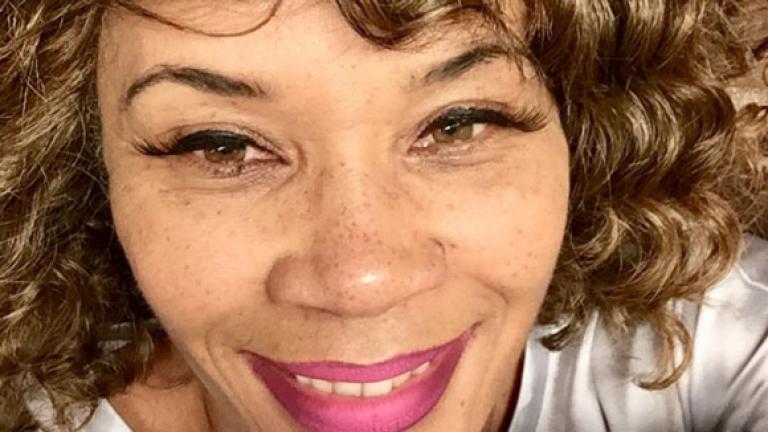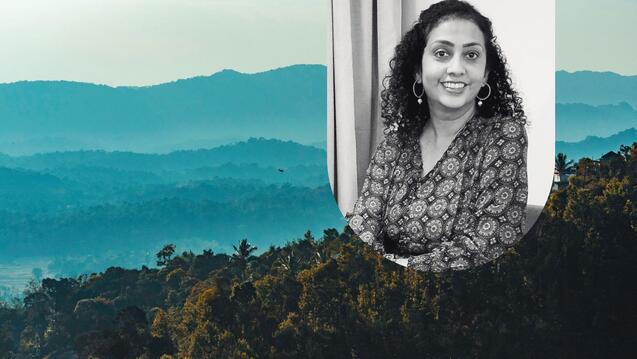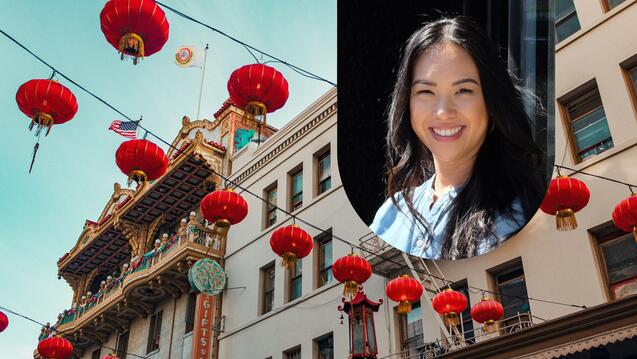A graduate’s journey integrating Eastern contemplative wisdom with Western depth psychological frameworks.

Planting My Voice
Bachelor Completion Program Alum Regina Louise on History, Hope, and Her New Movie
On a sunshine-filled morning after a long winter of rain, I sat in a window seat at Mission Pie in San Francisco’s Mission District with Regina Louise, writer, advocate, activist, and 2012 alum of the Bachelor of Arts Completion Program in the School of Undergraduate Studies at CIIS.
Regina Louise radiates a magnetic, enviable, and hard-won self-possession. She is funny, dead serious, and deeply compassionate, and the story of her traumatic journey through the foster care system is the subject of the film I Am Somebody’s Child: The Regina Louise Story, which was released April 20, 2019, on Lifetime.
Let’s talk about this moment, when your story is appearing on Lifetime.
I have to normalize this journey and understand this is just a Warholian moment; it’s 15 minutes. Not to get caught up, not to forget who I am, what this is about. I cannot be seduced by the illusion that this means I’m better now than I was 15 minutes ago. Or that I'm more important than I was 15 minutes ago. Or I'm somebody else. No. I'm just Regina Louise.
Let’s back up a bit and talk about your experience at CIIS. What brought you back to school to complete your Bachelor's degree?
I emancipated from foster care at 19 and went right to San Francisco State. I was there as long as I could get away with, and then I moved on. A multitude of reasons brought me back, not least, keeping a vow to myself that one day I wanted to earn an education.
I had heard of CIIS from a friend, a client, different people. I passed by the school on my way to work nearly every day and I thought “One day, one day, one day.” I even went inside the building, and I actually spoke in the stairwell, grinding it into my bones and said, "One day I'm coming back. I'ma plant my voice here now, and I'll be back for you."
My son ended up in college, but he was failing. I said, "You gotta turn this around." But he was like, "Why? You don't have a degree."
So, I thought, "He's right!" And I had already made the vow, but you know, life happens. So, I said, "Okay. It's on." I stepped out of my life as a speaker, and author, enrolled, and went back to school. I finished eight months before my son.
We were on this parallel journey. He’d been hell-bent on self-destruction because he had sustained an injury that knocked him out of his dream of becoming a basketball player. He needed another thing to compete against.
I wanted to show him how important it is to walk my talk and not just, you know, have this power-over dynamic. But to say, “Let’s—with mutuality—go and get what we can and what we deserve, and we deserve it because we're willing to commit and do it.” You know, and it had to be CIIS.
Why was CIIS the right place for you?
You know when you're preverbal and you don't have the language for something? It's a little bit like that. I believe that who I am and who I'm ever-becoming as a social agent is consistent and congruent with the values and the mission of CIIS. I knew that it was a place for me because of the approach. The alternative way. The experiential way; of feeling as if I am being treated fairly, from a place of equanimity and equality. I think it's an elite education amongst the mystics, and the metaphysicians, and those of us who are setting the world on fire from a higher consciousness perspective.
People talk about “D” and “I” all the time. Diversity and Inclusion. They diversify easily, it seems, but they forget the inclusion part. When it comes to including the variety of voices, textures, and cultural experiences that seem to find their way to CIIS, effort is taken to include everyone into the fabric of the experience here. Brynn Saito [former faculty in School of Undergraduate Studies] said it best when I asked her once during new student orientation: "Why are you at CIIS?" She said, "Because when I walked through the door, I felt it was the first place in my life where every single part of me was welcome.”
I never forgot that. And I soon recognized what she’d said, that at CIIS, every part of me was welcome. It was the first place in my life—and in some ways since—where I have felt that.
I did things and presentations I never knew I could do. I was able to say things I'd never had permission to say. I got permission. I gave myself permission. My next book will go more deeply into what’s next for me. In it I will share practices and strategies that I hope will empower others to go deeper into their own personal growth!
It was CIIS that introduced me to the Pedagogy of the Oppressed. They introduced me to bell hooks, who I think would be Friere’s compadre. CIIS literally educated me in a way that taught and encouraged me to close the gap of disadvantage for myself. I don’t want to romanticize my experience there— there were days in the classroom that were really a struggle, and days when I walked away feeling the terror of what I didn’t know, as well as traumas I’d forgotten about. I’ll be the first to suggest that there’s a need to integrate more trauma-informed practices into the curriculum— but I can also say, that six years later, I continue to stretch and grow and reach and learn as a restorer of social justice because of the fundamental concepts I learned.
Did you know you were a writer before you came back to school?
I had already written Somebody’s Someone. It’s like a prequel and then Someone Has Led this Child to Believe is my second and together they form the roots for I am Somebody's Child.
Tell us about your path into writing.
I had an experience where I ran into my biological father on BART, and he did not recognize me. It devastated me, and I ran home. I hadn't seen him since my days in foster care. I thought I would commit suicide but, instead, I ran home and then something told me to get a pencil. Then something said, "Get a piece of paper," and I fought that, too. And then something said, "Start writing."
Then the next thing I know I'm writing, “Careful not to disturb the raggedy screen door that barely kept the man-eatin’ mosquitas from tearin’ our asses up, I leant my body into the frame and stared up at the sky. I could tell by the way the clouds moved that God was gonna to start cryin’ soon.” I realized, in fact, my body was shaking, and I just kept going. From there, I just started writing.
How CIIS helped me? I was a guest at Squaw Valley Community of Writers up at the resort in Tahoe. When I read what I wrote a woman said, “You're trying to emulate Toni Morrison. You're trying to emulate Alice Walker.” I'm like, “What?” She said, "Uh, that voice is already taken."
I didn't understand it at the time. It was when I got to CIIS that I began to understand that, "Oh, it's a black woman." They were "right" because in their own world, the white privilege and all of it, there can only be one. Who do I think I am?
CIIS helped me understand the historical constructs and the root of racism and ignorance. Oh, my God! Cornel West and I can sit down and have a more robust conversation now! Lol! Now I get it. Hegemony isn’t personal, it’s more of an insidious way for greed to feed on itself.
I've learned to close the gap on my disadvantage. What does that mean? I've educated myself. I was autodidactic before I arrived at the university.
Tell us about your decision to go get an MFA in Creative Writing at University of California, Riverside.
Well, you may not believe this but, actually, I applied and got accepted to every single master’s of public policy, and MSW program I applied to. I applied to seven; I got into all of them.
Then I took Alec MacLeod’s creative workshop elective. It was one of the most incredible experiences of my time at CIIS. As we’re all sitting in the group, there’s like 20 of us maybe, and during one session I made a book. I love to do smash up journals or deconstruct materials and create a book of collage, so I made a book. He was like, “Who makes a book in one session? Wow!”
As the time went on, he said, “You're an artist.” I'm like, “What?” He's like, “You’re an artist.”
So one day, I'm on my way to the class, I'm actually kind of late, and I get to a stop sign and I just break down crying, “I'm an artist. I'm an artist. Art lives in me, through me, as me.”
I asked Alec: "Is that what Master’s of Fine Art means?” He’s like, “Yeah, and it’s a terminal degree. It’s a PhD for artists.” I’m like, “What? Wait, wait, so that means I could study writing?”
I wanted to teach at CIIS. Once I tasted the culture, I was like, “I don't want to go anywhere else. I'm home. This is where I want to be. This is what I want to do.” But Michelle [Eng, Dean of School of Undergraduate Studies] told me that to teach at CIIS I had to go away first. So, heartbroken, I went away.
How was it to hand your story to the person who wrote the screenplay, Camille Thomasson? What was that experience like? Is she somebody you knew?
I met her in Squaw Valley. She was part of the screenwriting faculty and one of the high points of Squaw Valley. When I found out that this was green-lit, I called her up and said, “Do you know that my movie just got picked up?” She was like, “Do you have any idea who the screenwriter’s going to be?” I'm like, “No, but I'll mention your name.” She called and got herself hired.
I don't know how these things are done. You took a movie proposal to LA, to Lifetime?
What I did ... it’s crazy. I called the LA Times beat officer and pretend that I was a British journalist with a story that I couldn't get the rights to publish in the equivalent of the National Enquirer, the London Daily
I have two phones, my mom’s phone is in one hand and I am talking on the other in an accent saying “I’m from the London Daily, there's a story I want but, the rights holder wouldn't give it to me but I think it's perfect for the LA Times.” I said, “You must call her. You must pursue this opportunity. It's already on the AP. I'm imagining she's already deluged with so many offers.” She asked her name and I said, “Her name is Regina Louise, and the book is Somebody's Someone.” She said, “I already have the book on my desk.” I said, “Well, here's the contact info, reach out straight away.” Then I gave her my mom’s phone number.
The phone in my other hand rings. I'm like, “Hi, Jeanne Kerr, answering for Regina Louise. How may I help you?” She was like, “I can meet you in LA.” “Where in LA would you like to meet?” “At the Four Seasons.” “We’re there. We’ll meet you there tomorrow. I’m in LA.” But I’m really in Walnut Creek. I get to LA and tell my story. She gets it on the front page in column one.
So then here comes Perez Hilton’s website. When it comes out on the LA Times front page, me and my mom sit up and say, “We have to turn this into the most emailed story, and the only way to do it is to bombard, bombard, bombard, and keep switching computers.” We sent out probably 3,000 emails. It became the most emailed story of the day. Then I had 42 producers call me up the next day.
Then I met with all of them. I sat up at the W Hotel and talked to one after next after next. There was this one beautiful Jewish woman who... she told a holocaust story that just rocked me to my core, and I went with her. That’s how.
Is she an agent or an employee at Lifetime?
She’s the producer who pursues the movie, the content producer, then she gets the money producer, then they pay me, and I sign my rights over to them. They shop it to the network that they want to go to.
Incredible.
I've been doing this shit for 16 years.
When you say you've been doing this shit, you mean just making stuff happen?
Pioneering my possibilities. Watch what other people have done, and do that.
Tell me about your knowing that this story should be a movie.
Well, actually, I have it as a one-woman show. It's been optioned for 16 years.
So this thing that you did at the W was 16 years ago?
Yeah. I’ve been hustling this for 16 years. All of this was happening before CIIS.
The piece that I'm trying to put together is that moment in Alec’s class where he said you're an artist...
I had already done all that other stuff... but didn't know that I was an artist. I was just doing it, moving from my spirit. Spirit doesn't speak in terms of artist, architect. Spirit just goes. I didn't know there was a category that I should be in.
Why do I have to be called an artist? Why can't it just be that I show up, move outta the way and then something happens? I hope I’m always willing to move the hell out the way.
But there was something powerful about being able to say it.
Alec said, “You’re an artist,” and I cried and I cried because I realized all that I was doing, that is... I think my survival has been an art form.
Were there moments that were challenging about handing that over your story to Camille?
Of course. I wanted to write it, but I'm not a screenwriter. She is. I’m going to let her do it, but I have to trust her to tell my story. And do I think she told my story in the best way? Hell, no. No way. Do I think my story was whitewashed? Absolutely.
Are there parts of it that you feel like they got right?
Yes, the solitary confinement scenes, the feeling of how my mother was… It's all about who has permission, who gets to decide on the narrative, the story that needs to be told to fit into the construct.
You are an advocate. You are an artist. What's your greatest hope for this film?
What comes out is permission granted, permission for people to love, permission for children to allow themselves to be loved, permission to hope for a better future, permission to be a hope, be the hope you want to comfort you, that you want to see. One of the things that changed my life forever is when I stopped worrying about what someone was going to do for me or what didn’t happen, but decided I'm going to be that which happens for someone else. I want to be someone's prayer answered.
My life is about being that. When I was around 18 or 19 I allowed myself to belong to my enslaved ancestors, who worked day and night to create a today or tomorrow where I could be sitting here with you having this conversation. I’m going to be a hope. I belong to hope, so I can never not belong, and I'm never lost.
Related Academic Programs
Bachelor Completion Programs in Interdisciplinary Studies, Psychology, and Psychedelics
Related News
Dr. Karim Dajani, M.A. '95, Integral Counseling Psychology, joined Clinical Psychology’s annual spring conference to explore the social unconscious in the work of Wilfred Bion.
Transformative Leadership alum Cynthia Huie, M.A. '24, brings creativity and connection to the San Francisco small-business community.



